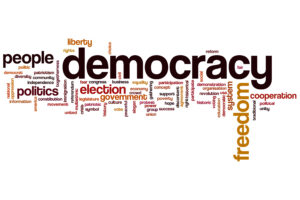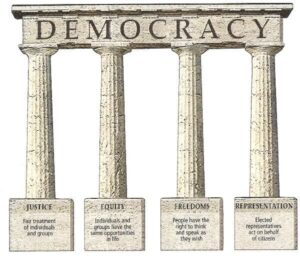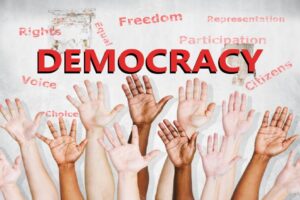Back to: Religion and National Value JSS2
Welcome to class!
In today’s class, we’re going to be talking about democracy. I trust you will enjoy the class!
Democracy
What is Democracy?

Democracy is a form of government where power is held by the people. It comes from the Greek words “demos” (people) and “kratos” (power), meaning “power of the people.” In a democratic system, citizens have the right to participate in decision-making, either directly or through elected representatives.
Key Features of Democracy

– Rule of Law: Everyone is equal under the law.
– Freedom of Expression: People can speak their minds without fear.
– Regular Elections: Leaders are chosen through free and fair elections.
– Majority Rule with Minority Rights: The majority makes decisions but the rights of the minority are protected.
– Accountability: Elected officials must answer to the people.
Types of Democracy
– Direct Democracy: Citizens vote on laws themselves.
– Representative Democracy: Citizens elect leaders to make decisions on their behalf.
– Constitutional Democracy: A system governed by a constitution that limits the powers of government.
Democracy in Action: Examples

– Town Hall Meetings: Where community members discuss local issues.
– Student Councils: Students elect their peers to represent their interests in school.
– National Elections: Citizens vote for their country’s leaders.
Democracy and Religion
In a democracy, there is often a separation between religion and state to ensure all religions are treated equally and that people have the freedom to practice their faith.
Democracy and National Values
National values like justice, equality, and freedom are the foundation of a democratic society. These values ensure that everyone has the opportunity to succeed and participate in the political process.
Challenges to Democracy
– Corruption: When officials use power for personal gain.
– Disinformation: False information spread to mislead people.
– Political Polarization: Extreme division between political groups.
Promoting Democracy
– Education: Teaching young people about their rights and responsibilities.
– Civic Participation: Encouraging citizens to be involved in their communities.
– Transparency: Making government actions open and understandable.
Remember, democracy is not just about voting; it’s about active participation and engagement in the community. It’s about having a voice and making it heard, respecting others’ voices, and working together for the common good.
